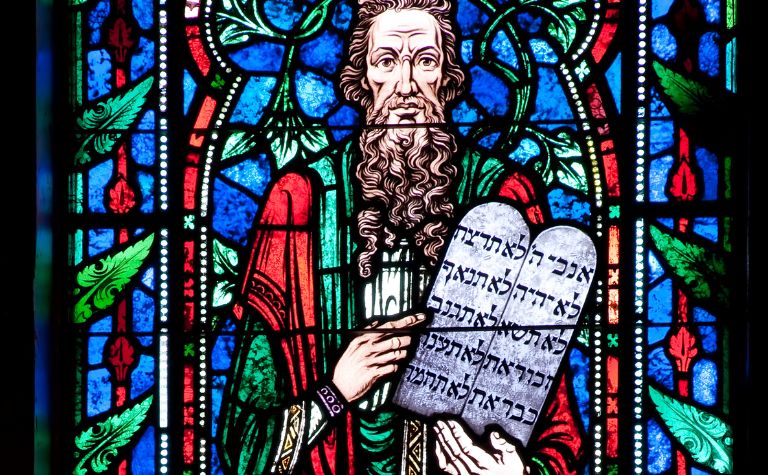Bible readers remember Moses for learning God’s name through a burning bush, parting the Red Sea using God’s power, and receiving the 10 Commandments from God on Mount Sinai. He is also known for writing down the Law and the first five books of the Bible. Because of Moses’ importance, people are interested in his life but also want to know about his death.
According to the book of Deuteronomy, Moses was 120 years old when he died. However, his body didn’t show signs of old age, like poor eyesight and loss of strength. Moses died because Israel was on the brink of the Promised Land, which God forbade him to enter. No one knows Moses’ burial place.
Did Moses die of old age? Why didn’t God allow him to enter the Promised Land? Who buried Moses? Is his obituary in the Bible positive or negative? What does the New Testament mention about Moses’ legacy? Keep reading to learn the answers to these questions and others.
Also, the story of Moses’ death is one of the most unique in the Bible. Discover how Moses died and why to gain more insight.

Moses Died Prematurely At 120 Years Old
When Moses was 120, the Israelites were on the edge of Canaan, the Promised Land (cf. Deut. 31:2). He knew he would not step foot in the land God promised his forefather, Abraham (Gen. 12:1-3). Yet he still wanted to see it because he had dedicated the last one-third of his life to leading his people there.
When they traveled near Canaan, Moses climbed Mount Nebo for a panoramic view of the land. His eyesight was still good (more below), and he could see major cities (Deut. 34:2-3). Reaching the land had been his objective as he wandered in the wilderness with his people for four decades.
God graciously allowed him to see the land but not to live in it. Looking at Canaan from a mountaintop was the climax of his ministry. Then, after Moses saw it, he died. The Bible implies that God buried Moses’ body, but no one knew the location of his grave (Deut. 34:6).
| Meaning of “Moses” | “drawn out of the water” |
| Date of Birth | 1520 B.C. |
| Ethnicity | Hebrew |
| Books Authored | Genesis to Deuteronomy |
| Date of Death | 1400 B.C. |
Deuteronomy reveals Moses’ age at death: “Moses was 120 years old when he died. His eye was undimmed, and his vigor unabated” (Deut. 34:7, ESV). The second half of the verse emphasizes that his body was in good physical condition. Another translation reads, “his eyesight was clear, and he was as strong as ever” (NLT).
Even though he was 120, the description informs readers that he didn’t die from old age. Moses died because he disobeyed God. Deuteronomy scholar Eugene Merrill writes, “He did not fail to enter Canaan because he died, but he died because he failed to enter Canaan.” [1]
Also, Moses’ family plays an essential role in his story. Many Bible readers want to know who Moses’ wife was to get more understanding of his family.

The Circumstances That Led To Moses’ Death
After God used Moses to lead the Israelites out of slavery in Egypt, the nation wandered in the desert for 40 years before they entered the Promised Land. The 40-year period of wandering included significant challenges. Some resulted from Israel’s sins, yet other tribulations were outside their control.
Moses exhibited incredible expressions of faith, like when he led Israel through the parted waters of the Red Sea and unfortunate moments of weakness. God had called him to a special role in Israel, but he was human, just like everyone else. After one lapse in judgment, God gave him the consequence of not entering the Promised Land.
Moses’ shortcoming was anger. In the scene, God told him to strike a rock for water. Yet Moses struck it twice, presumably out of frustration. He failed to obey God’s instructions. God responded, “Because you did not believe in me, to uphold me as holy in the eyes of the people of Israel, therefore you shall not bring this assembly into the land that I have given them” (Num. 20:12, ESV).
Also, Moses’ birth is unique in many ways. Many readers of Exodus are curious about his parents, wanting to know who Moses’ father was because so little is known about him.

Moses’ Obituary: His Faithful and Holy Legacy
Deuteronomy 34:9-12 reads like a modern-day obituary. It recounts positive aspects of Moses’ life of service to God and the nation of Israel. However, his life didn’t have an ideal ending, which reminds readers that Moses was human and his story wasn’t a fairy tale or myth.
While readers know Moses doesn’t get to enter the Promised Land because of sin, the final chapter in his narrative is positive. Merrill explains: “The final narrative of the book is overwhelmingly commendatory of Moses: there was no point to underscoring the sin that precluded his entry into Canaan, for this would work against the otherwise positive portrayal.” [2]
The last passage reminds readers of several positive aspects of Moses’ legacy:
- Joshua, Moses’ apprentice, would lead Israel. Moses’ faith, wisdom, and leadership would continue to impact Israel long after his death through Israel’s new leader (Deut. 34:9).
- God’s punishment of Moses wasn’t an indictment on his entire ministry.
- Despite his shortcomings, Moses’ legacy was his identity and role as God’s prophet (Deut. 34:10a).
- Moses knew God personally, i.e., “face to face” (Deut. 34:10b). The foundation of life and service was having a relationship with God.
- God worked through Moses in ways he has seldom worked through anyone in history, demonstrating His power and holiness (Deut. 34:11-12). Escaping slavery from Egypt wouldn’t just be Moses’ legacy but Israel’s.
Even though God prevented Moses from entering the Promised Land, he didn’t keep him from heaven. The New Testament makes this clear when he appears at the transfiguration of Jesus Christ along with Elijah (Matt. 17:3).
The book of Hebrews identifies Moses’ legacy as faithfulness to God. “By faith Moses, when he was grown up, refused to be called the son of Pharaoh’s daughter, choosing rather to be mistreated with the people of God than to enjoy the fleeting pleasures of sin” (Heb. 11:24-25, ESV).
References:
[1] Deuteronomy by Eugene H. Merrill. New American Commentary. p. 454.
[2] Ibid. p. 453.
[3] Deuteronomy by Daniel I. Block. NIV Application Commentary.
Related Questions
Moses had one of the most interesting families in the Bible. He was born to Hebrew parents, yet the Pharaoh's daughter raised him. Moses' siblings, Aaron and Miriam, played critically important roles...
Moses didn't live to experience the culmination of his life's work. He led his people out of slavery in Egypt, then through wandering in the desert for 40 years and eventually to the brink of the...
